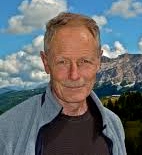Note: Author Erri De Luca was WINNER of the European Prize for Literature in 2013.
“This is how I see it: the hard work is nothing, just a way to make a living. But what matters is living with your head between your feet, your face down to tend the goings-on below. What matters is keeping your neck craned over the ground, caring more about it than about people…I’ve spent more of my life looking at the ground, water, clouds, walls, and tools than at faces. And I like them.” –unnamed speaker of this novel
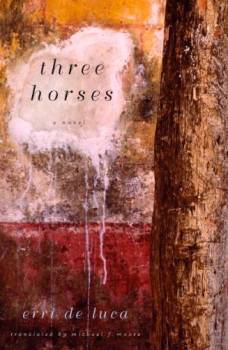 Within a swirling time frame and several settings which change suddenly through unexpected flashbacks, Italian author Erri De Luca creates a character whose life breathes with subdued passion and the tragedy of sudden terror. Now fifty, the unnamed speaker is working as a gardener/landscaper on a large estate in Italy owned by Mimmo, a filmmaker, someone the speaker knew when they were youths in Turin and with whom he shares a family background in Calabria in the toe of Italy. Leading a solitary life, the speaker is surprised one evening when an attractive younger woman flirts with him while she is eating lunch with another man at a tavern, then, on her way out, drops her card on the table where he is reading. After she’s gone, he plans what he might say if he were to see her again. He has had little social contact with other people in recent years, using his gardening skills and his connection with nature for his satisfaction – “caring more about it than about people.”
Within a swirling time frame and several settings which change suddenly through unexpected flashbacks, Italian author Erri De Luca creates a character whose life breathes with subdued passion and the tragedy of sudden terror. Now fifty, the unnamed speaker is working as a gardener/landscaper on a large estate in Italy owned by Mimmo, a filmmaker, someone the speaker knew when they were youths in Turin and with whom he shares a family background in Calabria in the toe of Italy. Leading a solitary life, the speaker is surprised one evening when an attractive younger woman flirts with him while she is eating lunch with another man at a tavern, then, on her way out, drops her card on the table where he is reading. After she’s gone, he plans what he might say if he were to see her again. He has had little social contact with other people in recent years, using his gardening skills and his connection with nature for his satisfaction – “caring more about it than about people.”
Now, however, “in the time he has remaining,” he thinks he might be ready to get involved with other people again, especially with this woman, Laila. Later, when they meet at her apartment, she confesses that she is an escort, a working girl. He confesses that he is a “fugitive,” who “doesn’t run toward open space but into many barred paths…The world is on my shoulders. Even the stars are dogs at my heels.” He says he has been living in the Southern Hemisphere, participating in a war there, “days filled with trouble, ruined by death that tears away clumps of us folks, stuffs thousands of the living, freshly plucked, into its sack.” He lived in Argentina for twenty years, a place where thousands of Italians found refuge and new lives after World War I, before the “dirty war” there in the 1970s.
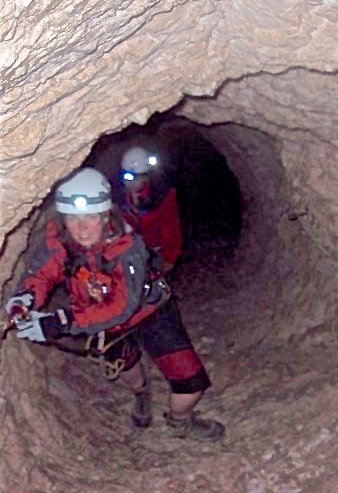
Climbers hold on to the ferrata (cable) inside the tunnel working their way to the top of the Tofana di Rozes, as the speaker and Dvora once did.
Time and place shift, as the speaker remembers his life in Argentina with Dvora, whom he first met in the Dolomites when they were climbing the Tofana de Rozes, so steep he climbed it with his cheek pressed against the stone. She, touring Europe as a graduation present from school in Argentina, meets him in the hut on the mountain and the next day ascends with him through the Castelletto mine tunnel to the top, the site of a major battle in World War I. It is only a short time before they return to Argentina together. “Married love between us begins in Argentina,” he explains, before they are caught up in the rebellion against the army in the mid-1970s, when “Argentina tears a whole generation from the world like a madwoman pulling at her hair. It kills its children, wants to be done with them. We’re the last.” Their married life lasts from their meeting on the mountain, site of a battle in Italy, to their separation during the war in Argentina and the speaker’s escape to Patagonia and eventually the Malvinas (Falklands). A long recovery working on a farm, and eventually a new relationship, evolve there.
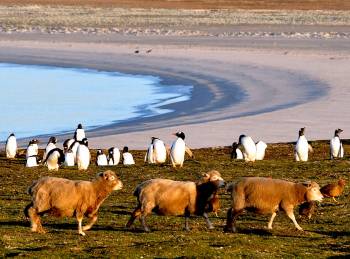
When the speaker works on a sheep farm in the Malvinas (Falklands), he is only 800 miles from Antarctica, a fact obvious in this photo. Click to enlarge.
Another swirl of time and place brings the reader back to Italy in the time of the novel’s opening. There the speaker, still working as a gardener, befriends an African refugee and provides him with food and company, learns about Mimmo’s experiences in Croatia during the war there, and reconnects with Laila, only to discover that she is fighting her own personal war. As he tries to sort out his life and what it means, the novel works its way up to a grand climax and startling finale. Themes related to life and death, war and peace, fear and commitment, and responsibility and self-preservation combine to affect the conclusion. Another time swirl, and the means by which the speaker escapes to Europe and eventually Italy become clear. The difference between having control over your life and just being lucky becomes obvious in the final sections of the novel. “I know I’m a man because I am the most dangerous animal,” he says. “This is not a hunt. It’s an act of destruction.”
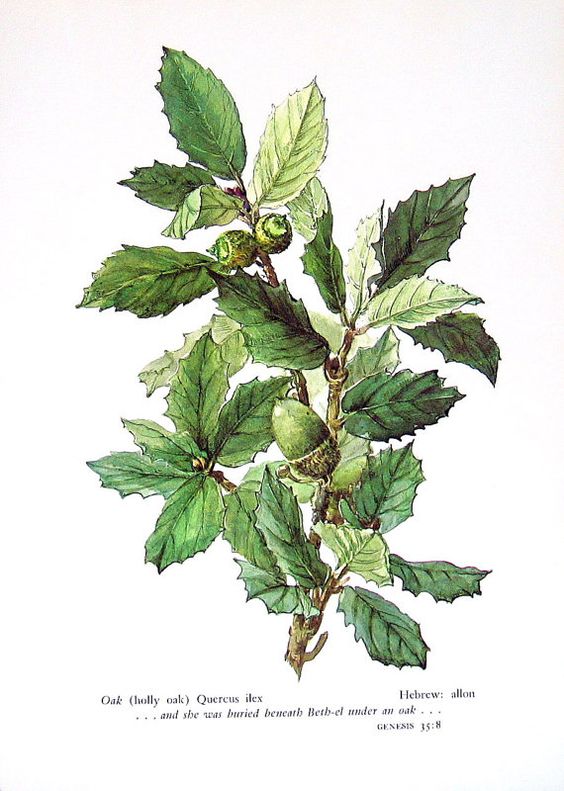
The holm oak, sometimes called the holly oak, is a tree that the speaker enjoys planting as part of his job. Note acorns and holly-like leaves. Click to enlarge.
In the conclusion of this sometimes romantic novel, the author reduces his writing style to the bare essentials, writing many short sentences in the subject-verb-object pattern, with each sentence being its own paragraph, matching the style to what is happening in the content. When he is in Argentina, in his thirties, trying to escape to Europe, an older tavern-keeper has told him that “A man’s life lasts as long as three horses’. You have already buried the first.” Now he is faced with a crisis, at the end of which he realizes that his “second horse has died.” A man who was once a revolutionary, who has come under the dominating influence of nature with its patience regarding growing and blooming, now realizes that he is no longer as comfortable with taking action to avenge grievances as he once was. A consummate reader, the speaker ultimately believes that “If I am someone else, it’s also because books move men more than journeys and years. I break away from what I am when I learn to treat my own life differently.”
Author Erri De Luca, recognized as “Italy’s most prominent writer,” and described by Milan’s daily newspaper Corriere della Serra as “the only true first-rate writer that the new millennium has given [Italy] for now,” is almost unknown in the US and Europe, and only four of his sixty-five novels have been translated into English. A man whose politics have always been on the extreme left in Italy, De Luca has never been a model for academia. For a number of years, he worked in a Fiat factory in Turin, and at the airport in Catania. He worked as a truck driver and as a mason. He has become an elite mountain climber, specializing in extreme climbing in the Himalayas. In 2013, he received international acclaim as the recipient of the European Prize for Literature. He continues to live his life on his own terms, accepting responsibility for his actions and inspiring others in his footsteps.
NOTE: Also by Erri De Luca: THE DAY BEFORE HAPPINESS
Photos, in order: The author’s photo appears on http://www.dislivelli.eu/
Like the speaker and Dvora, the climbers in the Catelletto tunnel are using the ferrata (cable) to climb to the top of the Tofana di Rozes. https://www.geocaching.com/
Brown sheep and penguins exist side by side on Soledad Island in the Malvinas (Falklands), where the speaker worked after escaping from Argentina. http://modernfarmer.com
Quercus Ilex, the holm oak or holly oak, is a favorite of the speaker for planting on the estate where he works in Italy. Note the acorns and holly-like leaves: https://www.pinterest.com
Described by Milan’s daily newspaper Corriere della Serra as “the only true first-rate writer that the new millennium has given us for now,” Erri De Luca still challenges himself with extreme mountain climbing at the age of sixty-six. http://www.trentinofilmcommission.it/
